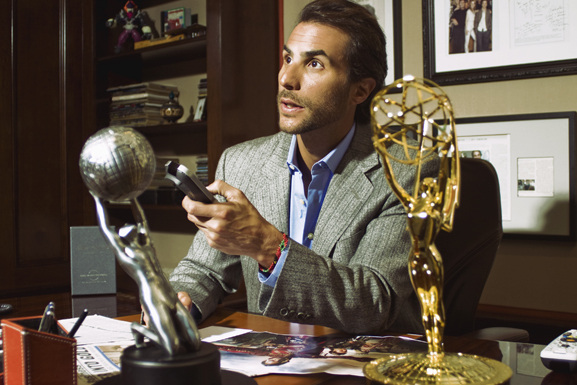Ben Silverman
“We’ll be a platform for great television shows, great digital content, great applications. It’s a kind of next-generation company. It exists in a non-traditional way, born of the needs that technology has accelerated. Factor in the revised economy, and you have to say, ‘okay the system is broken.’ How can you create a scalable model in a bespoke world?” explains the energetic 39-year-old.
The new company, Electus, in partnership with Barry Diller’s IAC/InterActiveCorp, is only a couple of months old at this point. “We’re having some great conversations with our partners in the ad community alongside the content community, where we’ll be able to have tons of projects in position for use across all different platforms in which brands already want to be a part of, so it’s exciting to have an idea and not only watch it take shape, but really exist,” says Silverman.
One of the first big moves Silverman made in putting this vision in motion was hiring Jordan Hoffner, the former head of content partnerships at Google YouTube, and Drew Buckley, a venture capitalist and the former head of Yahoo! Studios. Both exemplify the bridge Silverman is trying to build between Silicon Valley, Hollywood, and Madison Avenue.
Silverman’s strategy of matching sponsors with programming from the outset is a formula he’s had great success with, dating back to The Restaurant, which was one of his earliest turns as executive producer with Reveille, the production company he formed in 2002. “The Restaurant was both a new kind of content and a new kind of deal to get that content. It was the first docu-soap, and it was also fully funded by American Express, Coors and Mitsubishi, and so we had a partnership in the beginning,” he reveals.
Other Silverman reality hits include The Biggest Loser—for which he is credited as the show’s creator—Blow Out, Date My Mom and Nashville Star. It was, however, Silverman’s knack for scripted programming, for creating new show ideas like The Tudors, and for finding formats from other countries and putting together creative teams to adapt that programming to the U.S. market that has won Silverman his greatest acclaim.
That’s just what he did with The Office, which Silverman “discovered” while watching television in London, where he was heading the international office of William Morris. “I said, ‘Oh my God, this is insane. Is it a reality show? Is it a sitcom? What am I watching here?’” recalls the entertainment creator. “So I tracked down Ricky Gervais, and he and I went to Starbucks together. He liked the meeting, walked me over to his agent’s office, and now we’re here.”

The Office went on to win the Emmy for Outstanding Comedy Series in 2006, which Silverman admits is deeply rewarding. “Standing up and accepting an Emmy, that’s really fun and profound, no matter what anybody says about it,” he says. “At the end of the day, it’s a great feeling.” He was nominated again for a Golden Globe on The Office this winter.
The Office is yet another example of the way Silverman adapts his creative productions to today’s economics. “The Office is a different kind of comedy. It is also lower cost because it is shot in the faux reality style, and I brought my dear friend Randall Einhorn from The Restaurant and Survivor to direct and shoot,” the mogul explains. “It brought the cost down because we could shoot it like a reality show.”
Another feather in Silverman’s producing cap is Ugly Betty, which was a Latin telenovela before Silverman put together a team to create it anew for the US. And, when Ugly Betty was nominated for the Emmy for Outstanding Comedy in 2007, it was up against The Office, which made Silverman the first producer since Norman Lear, three decades earlier, to have two shows nominated in that category in the same year. When Betty was up for the Golden Globe, he came away a winner.
Such phenomenal successes led NBC’s President and CEO Jeff Zucker to hire Silverman as co-chairman of NBC Entertainment and Universal Media Studios in May 2007, when the network was in fourth place behind CBS, ABC and Fox, where it remains today. “The networks are a lot of big lumbering ships, moving a little bit towards a lighthouse that’s far away,” he says. “It was hard for me to accept that the day I took the job.”
In fact, leaving his own Reveille Studio for NBC meant Silverman had to take a major pay cut, but it was a salary reduction he could well afford: He sold Reveille to Rupert Murdoch’s daughter Elisabeth for over $125 million.
There was never any chance that he would turn down the NBC offer, however, because as a ten- or eleven-year-old child, enamored by such hit NBC shows as Cosby and Hill Street Blues, Silverman told his mom that he would one day run NBC. Mary Silverman, a television programming executive for decades who has worked everywhere from the Disney Channel to the BBC, encouraged her son.
Young Ben began training for his life’s work very early, reading Variety and absorbing electronic media from the age of about seven. Although his parents divorced, both have influenced him greatly. His mom taught him all about the architecture of the television business, while his dad, avant-garde composer Stanley Silverman, exposed his son to the great cultural and artistic experiences available in New York City.
Meanwhile, Ben glued himself to the television. “I’d say, Mom, I’m going to be in television. I need to be able to watch TV,” he recalls. “After school, I was a latchkey kid, and so I’d come home and watch television all afternoon and then later on at night. I’d even not go to school. I just didn’t like going to school in the morning. I was very bored with school, so I’d watch game shows and stuff on during the mornings, go into school late and then I’d come home and watch more television.”

“I wanted to leave NBC, so I left,” he asserts. “I have more excitement being in charge of my own company. NBC is amazing and an incredible institution, but it was just too big and there were a lot of hard, painful choices that still will continue to have to be made, and it was something that no one was going to invest money to spend their way out of, which would have been what I wanted to do.”
Stories on several Internet gossip columns, however, claim that Silverman always hated the job and didn’t stomach or have the corporate suit mentality to make it at GE. Silverman, however, defends his reputation. “You can’t make $300 million a year in revenue, manage a 2,200 person concern and live up to all the virtual image,” he retorts.
The bad-boy image that has manifested online, however, is not something Silverman goes out of his way to change. “I think growing up as a geek, I probably allow the bad-boy thing to percolate more because it’s just so fun,” he divulges. “As a mama’s boy, I’d rather be the bad boy in the virtual world than the mama’s boy in the virtual world, and I’d rather be the mama’s boy in the real world than the bad boy in the real world. The reputation gives me credibility when I want to go out. I get the reservations. I’ve got a gorgeous, fantastic fiancée. After all, it’s a bad-boy loving world.”
Silverman laughs when asked about reports of a loud screaming match with super-agent Ari Emanuel at the Universal executive dining hall. “I’ve had more loud arguments with more people everywhere in the world over some form of mutual business dealing. So I’m sure I could have been talking about anything, anywhere, loudly, because when you’re passionate about stuff, you can sometimes raise your voice,” he says.
Those who have worked on projects with him have only the highest praise. Reality show producer Mark Burnett says Silverman’s background as an agent running the William Morris London office has helped make Silverman a great producer. “Ben is such a great organizer of elements,” Burnett remarks. “Ben, from being an agent and living in London, knows how to be a nucleus of all the great elements around him—stars, writers, hosts, producers, lighting people—assembling great teams. We produced The Restaurant together, so I’ve actually worked in the trenches with Ben. He’s a genius when it comes to understanding the core elements of television and core elements of advertising. Most importantly, Ben is a really good person.”
Nancy Dubuc, president of the cable network History, echoes such words. “I worked with Ben when I was at A&E and he was at Reveille. Clearly, he is one of the smartest, most innovative men in the industry,” she says. “Ben has been a leader in different ways of packaging and looking at how to produce entertaining programs. He has the energy of no one else I’ve ever met. I’ve always looked to Ben as a real go-to person.”
Faces in front of the camera also recognize his talents. “Ben is seriously smart, and his intelligence is matched by his charisma. This could be a dangerous combination if he ever chose to use his powers for evil,” jokes comedian Joel McHale, the host of E!’s The Soup and star of NBC’s Community. “Thankfully, he’s a very good person. Even if you don’t know him well, you’ll want to hang out with him because his energy is infectious.”
Moving forward with Electus, Silverman is once again traveling the world, finding concepts for new shows. Advertisers will be integrated into programming, and in some cases, programming will actually be built around their products. “The advertising community is looking for ways to get their brand messages and brand identities more accessed and hopefully and potentially more influential in terms of driving sales and return on investment,” notes Silverman.
Electus will pick up where Reveille left off. “The opportunity to create anew every five, six or seven years is necessary in the media, advertising and technology business. The ability to see what’s needed today and start a company for what’s needed today is really an amazing opportunity,” says Silverman.
“It’s more and more clear that the consumer wants his or her programming anytime, anywhere, any place, on demand and on the go. Advertisers want to be able to reach that consumer and the system that currently exists somehow doesn’t connect those two ideas,” Silverman remarks. “Our company does.”
Photos by Michael Yates.


